Mick Malthouse: Playing out of a hub has further compromised the season
Mick Malthouse isn’t dancing around the asterisk debate, declaring if it wasn’t for the big dollars from the broadcast rights, a season so heavily compromised wouldn’t go ahead. Is he right?
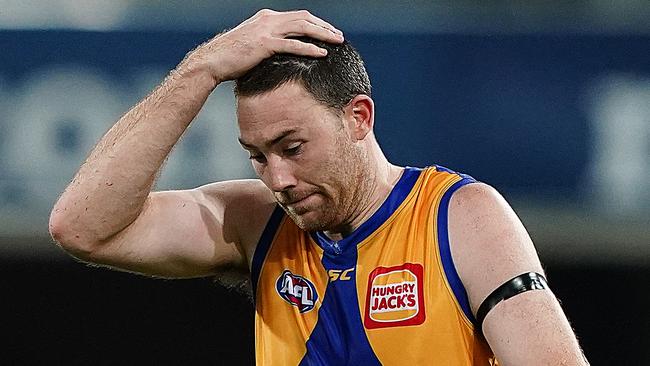
Expert Opinion
Don't miss out on the headlines from Expert Opinion. Followed categories will be added to My News.
These are strange times indeed.
Though if we look back through the history books, Australian rules football has dealt with strange circumstances before.
In 1916, during World War I there were only enough numbers for four teams to compete in the VFL.
They played a 12-round season and Fitzroy, after finishing last on the ladder with just two wins, a draw and nine losses, won three consecutive finals including a 29-point triumph against Carlton in the Grand Final. There is no asterisk next to the Fitzroy’s name as premiers that year, but clearly it was a compromised season.
In 1942, during the Second World War, 11 clubs competed (no Geelong). Five clubs had one bye and the other six had two.
Essendon won the Grand Final, held at Princes Park because the MCG had been taken over by the USA Army Air Force.
And here we are, again, playing a compromised season.
A season with clubs in hubs, state border closures, quarantine, few to no supporters in the stands, strict isolation rules, small group training sessions, and everyone jumping at shadows.
I hate to say it, but it is virtually a non-season. There are too many restrictions and too much compromise for it to be fair and even for all.
Kayo is your ticket to the 2020 Toyota AFL Premiership Season. Watch every match of every round Live & On-Demand. New to Kayo? Get your 14-day free trial & start streaming instantly >
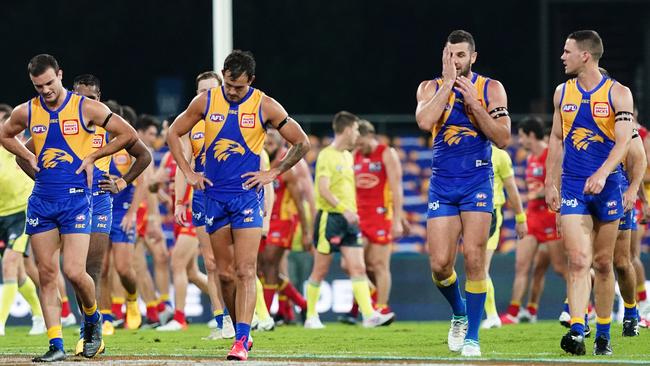
I’m not criticising the AFL, I wouldn’t want to be in its position right now. But the fact remains, if it wasn’t for the big dollars coming in from broadcast rights, a season so heavily compromised wouldn’t go ahead.
If it wasn’t for the sacrifice made by four clubs — West Coast, Fremantle, Port Adelaide and Adelaide — to move to Queensland and live in hubs for an unforeseeable amount of time, the season wouldn’t have been given the go-ahead at all.
Three of those clubs are suffering.
From the moment the hub motion was passed, the disruption for those clubs began and followed them to Queensland.
They had little time, if any, to train as a team on their home turf, instead they spent precious time organising and relocating to a new state.
Now the time frame has been pushed out by a week as state premiers get tough with their border restrictions. This creates uncertainty for players and their families at home, which in turn causes stress and anxiety.
The accumulative effect of hub life has been detrimental to good footy. At the start it was all new and exciting. By week two of lockdown it was tedious. By week three, drudgery. And by week four, the players are over it.
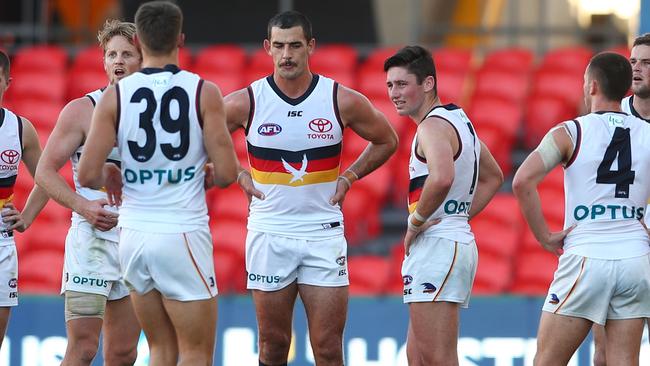
We’ve seen it reflected in the reduced performance of several players.
New Adelaide captain, Rory Sloane hasn’t measured up as the club’s leader yet. You only need to look at Marcus Bontempelli’s recent performances to see how critical it is to have a courageous and strong on-field leader. (After my early criticism I am pleased to see him standing up as Bulldogs captain.)
Taylor Walker hasn’t bolted to the top of the list in output either. As a former captain there is an expectation that he should still lead from the front and he hasn’t.
Important Eagle Jeremy McGovern is also lacking in form, but suspension and injury haven’t helped.
I applaud West Coast coach Adam Simpson for speaking out and taking a stand on hub timing. His players needed his public backing and strength.
The four hub clubs have done their bit for the competition to continue and they needed to know with certainty that they would get something in return.
It is easy to take pot shots from the outside, but let’s not mix apples with oranges.
When cricketers go on tour they can leave their hotel room for more than their match and training. They can go sightseeing, out for dinner, have family come and go, create rituals to make their environment feel like home.
For our four AFL clubs in Queensland hubs, 24 hours is a long time. They are locked down in a hotel with no outlet besides surfing and golf — pity if you’re not into those activities. There are only so many training sessions and meetings you can attend to pass the time.
And idle time leads to idle minds. This is where the danger lies in it becoming a mental health issue.
With partners and children on the phone from the other side of the country, the unintentional pressure on the player is hazardous.
The hubs are harder on older footballers with families, than younger teammates with only football to think about.
We need to remember these footballers are young men, not robots.
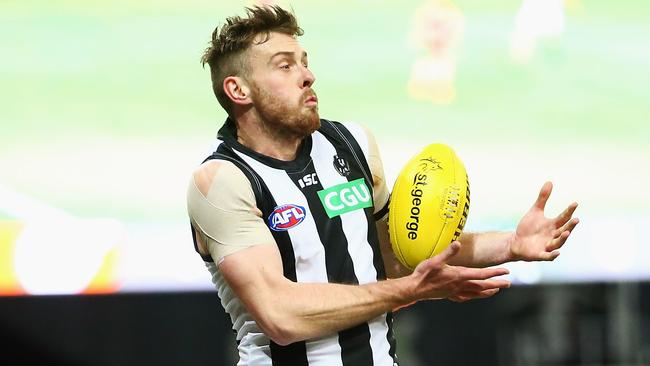
The uncertainty of the situation, and the irregularity in routine compounds any problems, and without doubt it has had an impact on the performance of many players and several teams.
The poor restart for the Eagles, Dockers and Crows leaves them exposed and vulnerable.
And the chest-beating from some Victorian clubs is just that — chest-beating. Because now it’s their turn.
As Geelong and Collingwood gear up for hub life in Perth, I imagine there are many players from both clubs with reservations.
We’ve already heard from Magpie Jordan Roughead and his reluctance to leave his wife for too long after a recent medical scare.
He wouldn’t be alone with those thoughts.
Family support is crucial for every footballer, but it’s a double-edged sword in quarantine. Do you take family over for morale and “normalcy”, or would their time in quarantine be too restrictive and claustrophobic?
Ideally, I’m sure the travelling clubs would prefer to get the hub games over and done with as fast as possible — without compromising the players’ health and ability.
As a coach of a travelling club I would want to get the games over and done with as fast as possible — without compromising the players’ health and ability.
Three games in 17 days is achievable. You don’t want your players to have too much idle time.
For Geelong, which is still looking for consistency, having the likes of Tom Hawkins sitting in a hotel room thinking about his form for too long is no good for the psyche.
Family would be a good distraction, but strict quarantine would also take a toll on them and that’s no help. I don’t know what the answer is.
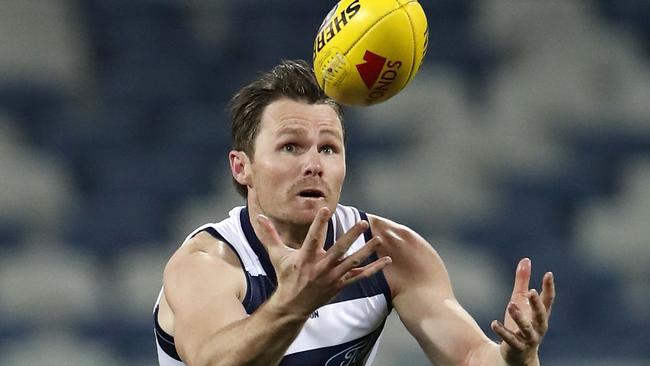
While the Victorian clubs sort through these and other issues, the West Australian and South Australian clubs need to pick themselves up off the deck, quick-smart, and make every post a winner if they are to revive their seasons.
As for the football loving public, there appears to be an apathy for this season. The
spark, it seems, is gone.
The length of the quarters is compounded by the length of the breaks. The quality of football is compounded by the restrictions on training. The outcome of games is compounded by the mental and emotional toll this is all having on our players.
Compound on top of compromise.
The AFL now has to squeeze in a leftover game, which could greatly affect the finals chances of Essendon and Melbourne if the timing is wrong for them.
If there is another hiccup (and the Conor McKenna hiccup was a terrible one with unfair consequences) where does that leave the season?
It is too fractured and uneven as it is. If it comes to a point that teams can’t produce their best football or close to their best, then it is at risk of becoming a mickey mouse season. That’s harsh, but true.
Too many of these early games have looked like practice matches. The discrepancy between the top and bottom sides is stark.
And talk of pushing finals into November or December needs to stop. That would just compromise next season and no one wants that. This needs to be avoided at all costs.
The AFL’s resolve to keep the Grand Final at the MCG will certainly be tested with offers from interstate venues and promises of bigger crowds.
But wherever it is held, it is certainly going to look a lot different to any other season we’ve had. Strange times indeed.
READ MORE:
Trade Secrets: How Richmond beat Collingwood and Hawthorn to secure Tom Lynch
Originally published as Mick Malthouse: Playing out of a hub has further compromised the season
